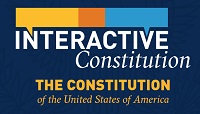Jeffrey Rosen, president and CEO of the National Constitution Center, welcomes you to We the People, a weekly show of constitutional debate.
Is the battle against ISIS legal on constitutional grounds, or an overreach of executive authority? Those questions were before a federal appeals court in late October, after an Army captain sued the executive branch for lacking specific authorization from Congress to attack the terrorist group.
President Donald Trump is now part of the case, called Smith v. Trump, which had its day in court on October 27 at the District of Columbia Court of Appeals. Also under debate is the subject of the President’s ability to take military actions outside of the War Powers Resolution, an act of Congress from the 1970s that most Presidents have ignored.
 Bruce Ackerman is Sterling Professor of Law and Political Science at Yale Law School. He is helping to represent Captain Smith in the Smith v. Trump case. He is the author of eighteen books that have had a broad influence in political philosophy, constitutional law, and public policy
Bruce Ackerman is Sterling Professor of Law and Political Science at Yale Law School. He is helping to represent Captain Smith in the Smith v. Trump case. He is the author of eighteen books that have had a broad influence in political philosophy, constitutional law, and public policy
 Chris Fonzone is Former Deputy White House Counsel and National Security Council Legal Adviser under President Obama. He helped to defend against the case while working for the Obama administration.
Chris Fonzone is Former Deputy White House Counsel and National Security Council Legal Adviser under President Obama. He helped to defend against the case while working for the Obama administration.
 Jeffrey Rosen is the President and Chief Executive Officer of the National Constitution Center, the only institution in America chartered by Congress “to disseminate information about the United States Constitution on a nonpartisan basis.” He is also a professor at The George Washington University Law School, and a contributing editor for The Atlantic.
Jeffrey Rosen is the President and Chief Executive Officer of the National Constitution Center, the only institution in America chartered by Congress “to disseminate information about the United States Constitution on a nonpartisan basis.” He is also a professor at The George Washington University Law School, and a contributing editor for The Atlantic.
Resources Mentioned In Podcast
- Oral argument audio in 16-5377, Smith v. Trump - U.S. Court of Appeals for the D.C. Circuit, October 27, 2017
- National Defense Authorization Act for Fiscal Year 2013 - 112th Congress, January 2, 2012
- Authorization for Use of Military Force - Joint Resolution, 107th Congress, October 16, 2002
- Authorization for Use of Military Force - Joint Resolution, 107th Congress, September 18, 2001
- Guide to the War Powers Resolution of 1973 - Library of Congress
- Opinion in Little v. Barreme, 6 U.S. 170 (1804) - U.S. Supreme Court, February 27, 1804
Additional Resources
 Our Interactive Constitution is the leading digital resource about the debates and text behind the greatest vision of human freedom in history, the U.S. Constitution. Here, scholars from across the legal and philosophical spectrum interact with each other to explore the meaning of each provision of our founding document.
Our Interactive Constitution is the leading digital resource about the debates and text behind the greatest vision of human freedom in history, the U.S. Constitution. Here, scholars from across the legal and philosophical spectrum interact with each other to explore the meaning of each provision of our founding document.
Common Interpretation
Commander-in-Chief Clause By Michael D. Ramsey and Stephen I. Vladeck
Matters of Debate
The President's Exclusive Power to Direct Military Operations By Michael D. Ramsey
How the Militia Clauses Inform the Scope of the Commander in Chief’s Inherent Power By Stephen I. Vladeck
Stay Connected and Learn More
Continue today’s conversation on Facebook and Twitter using @ConstitutionCtr.
Sign up to receive Constitution Weekly, our email roundup of constitutional news and debate, at bit.ly/constitutionweekly.
Please subscribe to We the People and our companion podcast, Live at America’s Town Hall, on iTunes, Stitcher, or your favorite podcast app.
We the People is a member of Slate’s Panoply network. Check out the full roster of podcasts at Panoply.fm.
The Constitution Center is offering CLE credits for select America’s Town Hall programs! In-person credit is now available in Pennsylvania, with more states to come soon.
And finally, despite our congressional charter, the National Constitution Center is a private nonprofit; we receive little government support, and we rely on the generosity of people around the country who are inspired by our nonpartisan mission of constitutional debate and education. Please consider becoming a member to support our work, including this podcast.








